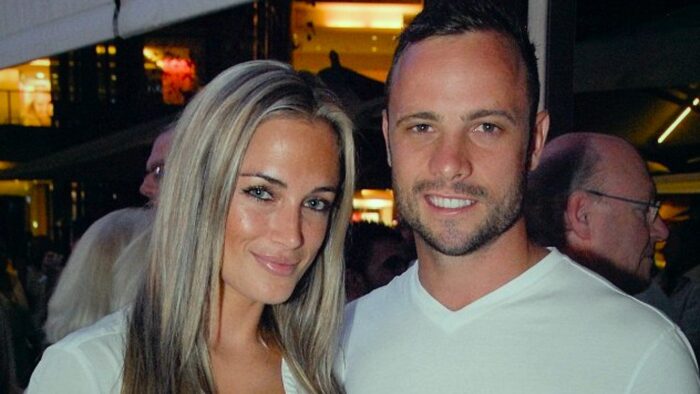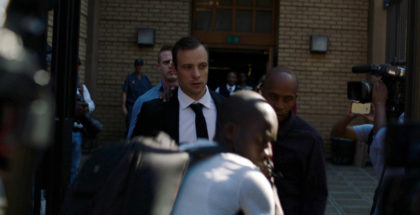True Crime Tuesdays: The Trials of Oscar Pistorius
Review Overview
Balance
2Victim representation
2Insight
2Helen Archer | On 10, Nov 2020
On Tuesdays, our resident true crime obsessive gets their fix with a documentary film or series. We call it True Crime Tuesdays.
There can’t be many people in the world who aren’t aware of Oscar Pistorius – although not for his sporting abilities. Those were eclipsed when, in the early hours of the morning on Valentine’s Day 2013, he fatally shot his 29-year-old girlfriend, Reeva Steenkamp, four times through a locked bathroom door. At that moment, his achievements on the racing track were outstripped by his notoriety as a murderer.
Even before the first episode screened on Saturday night on BBC Two, this four-part documentary – which runs over the course of a bloated 5 and a half hours – was the subject of condemnation, after the release of a two minute trailer that failed to mention Steenkamp by name and instead focussed on Pistorius’s life and career. Following mass complaints on social media, the BBC apologised and took the trailer down, replacing it with an advert they said was more representative of the content of the programme. Would the documentary manage to absolve itself and silence that criticism? The answer is a resounding no.
The sporting biography / true crime amalgamation has been done before, most notably – and successfully – with the Oscar winning OJ: Made in America and, more recently, with Netflix’s Athlete A and The Killer Inside: The Mind of Aaron Hernandez. Even the title of The Trials of Oscar Pistorius is somewhat offensive – while the programme looks at the murder trial and Pistorius’s fight with the International Association of Athletics Federations (IAAF) to win the right to compete in the 2012 Olympics, it also seems to suggest that Steenkamp’s murder was merely a part of his life’s struggle. It was directed for ESPN by Daniel Gordon, who specialises in sporting documentaries. It’s clear that his main interest is the sportsman rather than the murderer.
Structurally, it’s a bit of a mess. Leading into its subject from the breaking news of the shooting – with many interviewees going to pains to describe just how upset Pistorius was in the wake of Steenkamp’s murder – it quickly turns into a hagiographic biography of the “Blade Runner”. From his operation to have his lower legs amputated at 16 months of age to his mother’s death when he was 15 to his sporting triumphs and success as a runner in the Paralympics, many people are here to tell us just how special this young athlete was.
Shoehorned into all this is a brief look at South Africa of the 1980s, when apartheid ruled, with archive footage of peaceful demonstrations being met with violent and deadly state suppression. The ongoing epidemic of violence against women is given a cursory glance. There are brief soundbites about historical trauma and CCTV footage is shown of robberies and home invasions in order, one assumes, to explain Pistorius’s interest in guns, and his reasons for believing – as he said in his defence – that he was shooting at an unknown intruder, rather than at his girlfriend.
The third episode is given over almost entirely to his case against the IAAF, and it is not until the final episode that we get to his murder trial. This last hour and a half is probably the most revealing with regards to Pistorius’s state of mind, and his relationship with Steenkamp, and it would be advisable, if you must watch any of the series, to start here. Even on the track, his star was fading, leading to him hypocritically accusing his competitors of cheating on their more state-of-the-art blades. He was also embroiled in arguments with dangerous men, and his ex-girlfriend Samantha Taylor speaks about being scared he would use a firearm on her. A friend recounts the time, mere weeks before the murder, when Pistorius discharged his gun in a packed restaurant.
In court, we see the text messages from Reeva in which she admits to being frightened of him. Pistorius, for his part, weeps and wails in the witness stand as his evidence is forensically unpicked by prosecutors, while Reeva’s parents sit stony-faced at the sight of his histrionics. And yet, still, we cut to his cousin brightly insisting that Steenkamp’s parents should know that their daughter didn’t choose to be with someone who would shoot her. Still, we are asked to consider what an exceptional person Pistorius is, and what a personal tragedy this is for him.
In the days and weeks which followed Steenkamp’s death, and during Pistorius’s trial, the hashtag #hernamewasReevaSteenkamp trended again and again on social media, in retaliation to the way in which the coverage of the murder constantly rendered the model and paralegal invisible. It is remarkable, then, that a documentary about the perpetrator falls into the very same trap. If any good is to come from this film, it’s a powerful reminder that there is still work to do in reporting and documenting crimes against women. It’s just a shame that this wasn’t realised during at any stage during the making or broadcasting of this bizarre, exasperating and hugely disrespectful piece of work.
The Trials of Oscar Pistorius is available on BBC iPlayer until March 2021


















